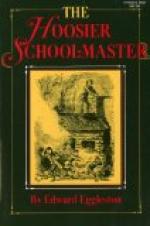CHAPTER V.
THE WALK HOME.
You expect me to describe that walk. You have had enough of the Jack Meanses and the Squire Hawkinses, and the Pete Joneses, and the rest. You wish me to tell you now of this true-hearted girl and her lover; of how the silvery moonbeams came down in a shower—to use Whittier’s favorite metaphor—through the maple boughs, flecking the frozen ground with light and shadow. You would have me tell of the evening star, not yet gone down, which shed its benediction on them. But I shall do no such thing. For the moon was not shining, neither did the stars give their light. The tall, black trunks of the maples swayed and shook in the wind, which moaned through their leafless boughs. Novelists always make lovers walk in the moonlight. But if love is not, as the cynics believe, all moonshine, it can at least make its own light. Moonlight is never so little needed or heeded, never so much of an impertinence, as in a love-scene. It was at the bottom of the first hollow beyond the school-house that Ralph overtook the timid girl walking swiftly through the dark. He did not ask permission to walk with her. Love does not go by words, and there are times when conventionality is impossible. There are people who understand one another at once. When one soul meets another, it is not by pass-word, nor by hailing sign, nor by mysterious grip that they recognize. The subtlest freemasonry in the world is this freemasonry of the spirit.
Ralph and Hannah knew and trusted. Ralph had admired and wondered at the quiet drudge. But it was when, in the unaccustomed sunshine of praise, she spread her wings a little, that he loved her. He had seen her awake.
You, Miss Amelia, wish me to repeat all their love-talk. I am afraid you’d find it dull. Love can pipe through any kind of a reed. Ralph talked love to Hannah when he spoke of the weather, of the crops, of the spelling-school. Weather, crops, and spelling-school—these were what his words would say if reported. But below all these commonplaces there vibrated something else. One can make love a great deal better when one doesn’t speak of love. Words are so poor! Tones and modulations are better. It is an old story that Whitefield could make an audience weep by his way of pronouncing the word Mesopotamia. A lover can sound the whole gamut of his affection in saying Good-morning. The solemnest engagements ever made have been without the intervention of speech.




